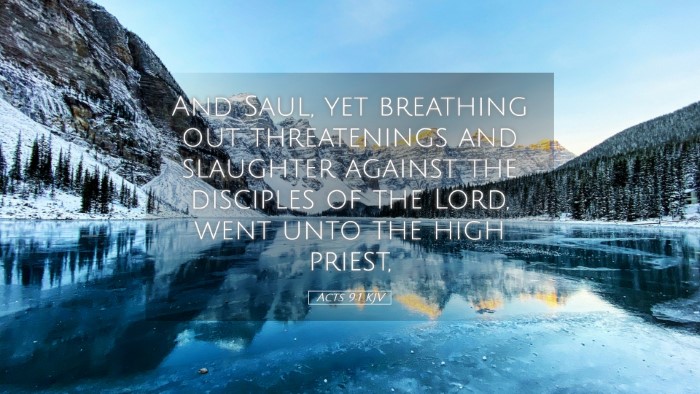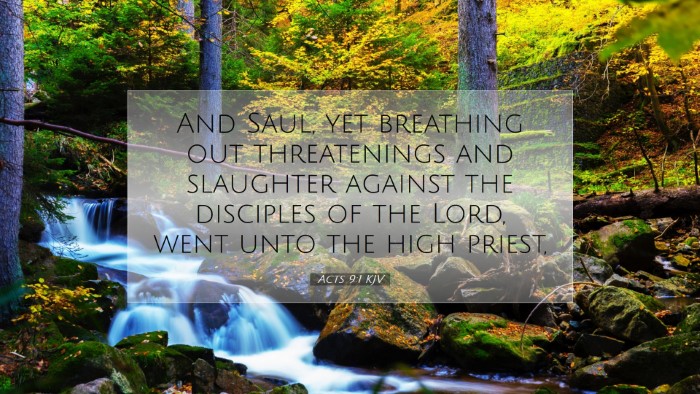Commentary on Acts 9:1
Verse Reference: Acts 9:1 - "And Saul, yet breathing out threatenings and slaughter against the disciples of the Lord, went unto the high priest."
Introduction
The transformation of Saul of Tarsus is one of the most profound narratives in the early Christian church, and Acts 9:1 sets the stage for this pivotal moment. Understanding the context and implications of this verse opens a window into the dramatic shift in Saul's life, from a persecutor to one of the most influential apostles of Christianity.
Contextual Insights
Saul, later known as Paul, is introduced in the Acts of the Apostles as a fierce opponent of the followers of Christ. His actions represent a significant conflict between the early Christian movement and traditional Judaism. The language in Acts 9:1 describes Saul's intensity as he "breathing out threatenings and slaughter," which indicates a zealous determination to eradicate followers of Christ.
Historical Background
- Saul was a Pharisee, well-educated in the Jewish law and customs.
- He was present at the stoning of Stephen, the first martyr of Christianity, highlighting his active role in persecution (Acts 7:58).
- This persecution was not isolated; it was part of a broader reaction against the growing movement of early Christians threatening the established religious order.
Theological Reflections
The growth of the early Church amid intense persecution raises questions about God's sovereignty and the role of human agency. Saul's zeal and efforts, although misguided, were part of a divine plan that would ultimately lead to the expansion of the Gospel.
God's Sovereignty in Human Actions
Matthew Henry notes that God's purpose can even be fulfilled through the actions of His enemies. Saul's persecution did not thwart the spread of Christianity; rather, it intensified it, as scattered believers preached the Gospel wherever they went (Acts 8:4).
Transformation Narratives
Saul's transition from persecutor to preacher is a hallmark of God’s grace and the transformative power of an encounter with Christ. As Albert Barnes comments, "It is a remarkable instance of the power of divine grace that one who was so determined to spread destruction and fear could be used to spread the message of hope and salvation."
Characters in Acts 9:1
- Saul of Tarsus: As a Pharisee, his strong background in Jewish law positioned him firmly against the Christians.
- The High Priest: Represented the Jewish authority and was the one Saul sought approval from to pursue Christians further.
Practical Applications
For pastors and leaders, Acts 9:1 serves as a powerful reminder about the potential for change in even the most hardened individual. It challenges us to consider who we deem unreachable or irredeemable.
Encouragement for Evangelism
We are called to evangelism not only in compassion but also with the confidence that God can work in individuals who may seem entirely opposed to the Gospel. The effectiveness of this message is powerfully illustrated in Saul's radical transformation.
Personal Reflection and Growth
The passage invites believers to examine their lives for areas of personal zeal that could benefit from redirecting towards the purposes of Christ. Like Saul, we may have misdirected energies that, when transformed by the love of Christ, can serve the Church and community effectively.
Conclusion
Acts 9:1 is not just the inception of a story of transformation; it is a testament to the power of God’s grace when encountering those who are lost. As we reflect on Saul’s fervor, may we also reflect on our own lives, seeking God to align our passions with His will, and remembering that transformation is always possible through Christ.


